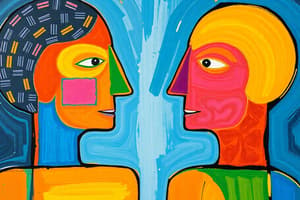Podcast
Questions and Answers
What is person perception?
What is person perception?
The mental processes we use to form judgments and draw conclusions about the characteristics and motives of other people.
Define social norms.
Define social norms.
The rules or expectations for appropriate behavior in a particular social situation.
What is the just world hypothesis?
What is the just world hypothesis?
The assumption that the world is fair and that therefore people get what they deserve and deserve what they get.
Explain blaming the victim.
Explain blaming the victim.
What is the fundamental attribution error?
What is the fundamental attribution error?
Define self-serving bias.
Define self-serving bias.
What is a cognitive attitude?
What is a cognitive attitude?
What does affective attitude refer to?
What does affective attitude refer to?
What is behavioral attitude?
What is behavioral attitude?
Define cognitive dissonance.
Define cognitive dissonance.
What is an in-group?
What is an in-group?
Define out-group.
Define out-group.
What is ethnocentrism?
What is ethnocentrism?
Explain the jigsaw classroom technique.
Explain the jigsaw classroom technique.
What were the Milgram study results?
What were the Milgram study results?
What is the feel-good do-good effect?
What is the feel-good do-good effect?
Define the bystander effect.
Define the bystander effect.
What is stereotype thinking?
What is stereotype thinking?
What is informational social influence?
What is informational social influence?
Define normative social influence.
Define normative social influence.
Who was Kitty Genovese?
Who was Kitty Genovese?
Flashcards are hidden until you start studying
Study Notes
Person Perception
- Involves mental processes used to judge others' characteristics and motives.
Social Norms
- Define expectations for appropriate behavior in various social contexts.
Just World Hypothesis
- Reflects the belief that the world is fair, leading to the assumption that individuals receive outcomes they deserve.
Blaming the Victim
- The inclination to hold a victim responsible for their misfortune, suggesting they caused or could have prevented it.
Fundamental Attribution Error
- Tendency to attribute others' actions to personal traits while downplaying the influence of situational factors, such as misinterpreting a trip as clumsiness rather than a wet floor.
Self-Serving Bias
- People commonly credit their successes to internal factors and their failures to external circumstances.
Cognitive Attitude
- Encompasses thoughts and beliefs regarding a topic or situation.
Affective Attitude
- Relates to feelings and emotions connected to a certain topic.
Behavioral Attitude
- Refers to actions taken concerning a topic or situation.
Cognitive Dissonance
- Describes the psychological discomfort arising from conflicting attitudes and behaviors, prompting a desire for consistency.
In-Group
- A social group that an individual identifies and belongs to.
Out-Group
- A social group that an individual does not belong to or identify with.
Ethnocentrism
- The belief in the superiority of one’s own culture or ethnic group, leading to biased judgments of other cultures.
Jigsaw Classroom Technique
- Promotes cooperative learning by placing students in diverse small groups for projects, enhancing self-esteem and fostering positive intergroup relations.
Milgram Study Results
- Indicated that approximately 66% of participants were willing to administer the maximum shock of 450 volts, highlighting issues of authority compliance.
Feel Good, Do Good Effect
- Suggests individuals feeling positive emotions are more inclined to assist others in need.
Bystander Effect
- Describes the phenomenon in which the presence of others inhibits an individual's willingness to help someone in distress.
Stereotype Thinking
- Involves overly generalized beliefs about specific groups or categories of people.
Informational Social Influence
- Highlights how individuals can gain valuable information from the behaviors or decisions of others in uncertain situations.
Normative Social Influence
- Reflects the desire for social acceptance and belonging within a group.
Kitty Genovese
- Her murder catalyzed research on factors influencing altruism, particularly the bystander effect.
Studying That Suits You
Use AI to generate personalized quizzes and flashcards to suit your learning preferences.




